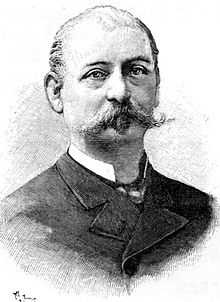Georges Henri Halphen

George Henri Halphen (30 October 1844, Rouen – 23 May 1889, Versailles) was a French mathematician. He did his studies at École Polytechnique (X 1862). He was known for his work in geometry, particularly in enumerative geometry and the singularity theory of algebraic curves, in algebraic geometry. He also worked on invariant theory and projective differential geometry.[1]
He received in the Steiner prize of the Prussian Academy of Sciences in 1880 along with Max Noether. In 1881 Halphen received the grand prize of the Académie des sciences for his work on linear differential equations Mémoire sur la Reduction des Equations Différentielles Linéaires aux Formes Intégrales. He received the prix Poncelet in 1883[2][3] and the prix d'Ormoy in 1885. He was elected to the Académie des sciences in 1886 in the Section de Géométrie, replacing the deceased Jean-Claude Bouquet.[4] In 1887 Halphen was elected to the Accademia dei Lincei in Rome.[5]
In 1872 he married Rose Marguerite Aron, with whom he had eight children, four sons and four daughters. Of the four sons, three joined the military and two of them died in WWI. One of his grandsons was Étienne Halphen (1911–1954), who did significant work in applied statistics.[6]
Works
- Oeuvres, in 4 vols. edited by Camille Jordan, Henri Poincaré, Charles Émile Picard with assistance from Ernest Vessiot, 1916, 1918,[7] 1921,[8] 1924,[9] Gauthier-Villars
- Traité des fonctions elliptiques et de leurs applications, 3 vols., 1886, 1888, 1891 (in vol. 2 applications to physics, geometry, the theory of integrals, and geodesy; in vol. 3 applications to algebra, especially the quintic equation, number theory — vol. 3 consists merely of fragments)
Sources
- Bernkopf, Dictionary of Scientific Biography
- Gruson: Un aperçu des travaux mathématiques de G H Halphen in Complex projective geometry, London Math. Soc. Lecture Note Series vol. 179, Cambridge, 1992, pp. 189–198.
See also
References
- ↑ Cajori, Florian (1991). A History of Mathematics. New York: Chelsea. ISBN 0-8218-2102-4. (org. published by Macmillan, 1919)
- ↑ "Prix". Comptes rendus hebdomadaires des séances de l'Académie des sciences. Tomes XCII à CXXI, 3 Janvier 1881 à 30 Décembre 1895. Paris: Gauthier-Villars. 1900. p. 1570.
- ↑ "Prizes given by the French Academy". The American Naturalist (U. of Chicago Press) 18: 751. 1884.
- ↑ Émile Picard, Notice sur la vie et les travaux de Georges-Henri Halphen, CRAS, 1890
- ↑ Poincaré, Henri (1890). "Notice sur Halphen". Journal de l'École polytechnique 60: 137–161.
- ↑ Les Juifs de Picardie
- ↑ Carmichael, R. D. (1921). "Review: C. Jordan, H. Poincaré, É. Picard, and E. Vessiot, Oeuvres de G. H. Halphen (Tomes I, II)". Bull. Amer. Math. Soc. 27 (9-10): 466–469. doi:10.1090/s0002-9904-1921-03474-4.
- ↑ Carmichael, R. D. (1922). "Review: C. Jordan, H. Poincaré, É. Picard, and E. Vessiot, Oeuvres de G. H. Halphen (Tome III)". Bull. Amer. Math. Soc. 28 (5): 271–272.
- ↑ Carmichael, R. D. (1925). "Review: C. Jordan, H. Poincaré, É. Picard, and E. Vessiot, Oeuvres de G. H. Halphen (Tome IV)". Bull. Amer. Math. Soc. 31 (9): 562–563.
External links
- O'Connor, John J.; Robertson, Edmund F., "Georges Henri Halphen", MacTutor History of Mathematics archive, University of St Andrews.
- Jewish Encyclopedia
- (French) Biography on the Université de Rouen site
- A few of Halphen's works available online
- Halphen's dissertation (Sur les invariants differentiels) and his 3 volume work on ellptic functions available online
|